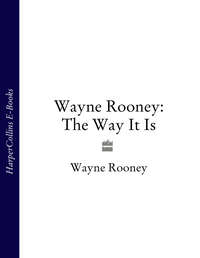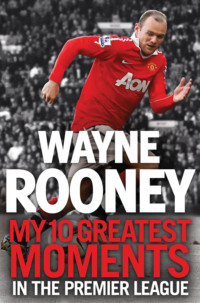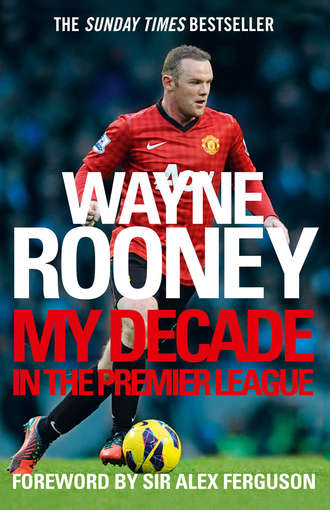
Полная версия
Wayne Rooney: My Decade in the Premier League
*****
I make a good early pass. Well, I take the kick-off so I can’t really mess that one up. My first proper touch comes a few moments later and I play that one well, too. I’m running on pure adrenaline.
I want to impress everyone. I want to show them what I can do.
Then, in the 17th minute I score my first-ever United goal.
Ruud plays me through. I’m one-on-one with the goalie and everything slows down – the weirdest feeling in football. It seems to take an hour before I get to the penalty area, as if I’m running in really thick mud. My brain goes into overdrive like it always does in this situation, as if it’s a computer working out all the sums needed to score a goal.
Is the keeper off his line?
Is a defender closing in on me?
Should I take it round the goalie?
Should I shoot early?
Will I look a divvy if I try to ’meg him and I hit the ball wide?
A one-on-one like this is probably the hardest thing to pull off in a game because there’s too much time to process all the info, too much time to think. Too much time to overcomplicate what should be an easy job.
I’m just going to put my foot through it, see what happens.
I hit the ball with all my strength and it rockets into the back of the net. Old Trafford goes nuts. Right now I doubt anyone cares whether I’m a Scouser or not, I’m off the mark. Mentally I loosen up, I feel like I can express myself a little bit, try a few things. Not long afterwards, Ryan Giggs plays a ball across to me. I drop a shoulder, do my defender and fire the ball into the bottom corner. Now the crowd are singing my name again; now I’m daring to dream.
What would it be like to score a hat-trick at Old Trafford?
I find out in the second half. There’s a free-kick on the edge of the Fenerbahçe area and Giggsy, with all his amazing ability and experience, puts the ball down to take it, but I want it. I’ve got bucketloads of confidence and I fancy my chances, just like I did whenever I got into the ring with a bigger lad in Uncle Richie’s boxing gym. I just know I’m going to score – it’s mad, I can almost sense it’s going to happen.
‘Giggsy, I’m putting this one away.’
He hands the ball over and I curl a shot into the top left-hand corner, easy as you like. Goal number three, a hat-trick on my Old Trafford debut.
We win 6–2 and in the dressing room afterwards everyone seems to be in a state of shock. I don’t think anybody can believe what I’ve just done out there. I can’t get my brain around it either. Rio sits there shaking his head, looking at me like I’ve just landed from outer space. The older lads, like Gary Nev and Giggsy, are thinking the same thing, I can tell, but they’re keeping it in. They’ve probably seen amazing stuff like this loads of times before with players like Eric Cantona and David Beckham, so they stay silent. They probably don’t want to build me up just yet. To them, my hat-trick is part of another day at the office, just like it is to The Manager, who shakes my hand and tells me I’ve made a good start to my United career.
Nobody’s getting carried away.
There isn’t a massive party to enjoy afterwards, no one gets bevvied up or hits the town. Some players I know would be out with their teammates having scored a hat-trick on their debut. Instead, everyone goes home. But not me, I haven’t even got a gaff to go to. Coleen and I are living out of a hotel while we look for a new house, so to celebrate the start of my Old Trafford career we order room service and watch the match highlights on the box, but it all seems so weird.
I feel numb.
I always knew that I was going to experience a massive change in my life by signing for United, but I didn’t expect it to be this big. The strangest thing is, I don’t feel like I’m on the verge of anything special. I don’t feel like a special player. I’ve never felt that way, even as a kid playing for Everton. Tonight as we sit eating our room service tea I feel confident, confident that I have the ability to help United win games and trophies, but I can see that everyone else in the dressing room has the ability to do that, too.
At Old Trafford I’m nothing special; I’m not a standout player. But I reckon I can help United to be a standout team.
*****
Despite my brilliant start, it doesn’t take long for me to get up Roy Keane’s nose.
On the pitch, Roy’s a leader; I can see that from training with him. He yells a lot, he inspires through example, but he rarely dishes out instructions – he’s just really demanding, always telling us to graft harder.
He can be just as demanding off the pitch.
On the night before my first away game against Birmingham City (a 0–0 draw), the squad sits down for tea in the team hotel, a fancy place with a private dining room just for us, complete with plasma screen telly. Roy’s watching the rugby, but the minute he gets up to go to the loo, I swipe the controls and flip the channel so the lads can watch The X Factor on the other side. Then I stuff the remote in my trackie pocket.
When Roy comes back and notices Simon Cowell’s face on the telly, he’s not happy. He starts shouting.
‘Who’s turned it over? Where’s the remote?’
I don’t say a word. Nobody does. Everyone starts looking around the room, trying to avoid his glare.
‘Well, if no one’s watching this, I’ll turn it off.’
Roy walks up to the telly and yanks the plug out of the wall. The lads sit there in silence. There isn’t a sound, apart from the scrape of cutlery on plates. It’s moody.
After dinner we all crash out early, but at around midnight, I get a knock on the door. It’s the club security guard.
‘Alright Wayne,’ he says. ‘Roy’s sent me. He wants to know where the remote controls are.’
I realise it’s Roy’s way of letting on to me that he knows exactly what’s happened. It’s a message.
You’re for it now.
I hand them over and wonder what’s going to happen. But the next day he says nothing about it.
*****
When I first sign for United, I think back to the times I’d watched them winning trophies and league titles on the telly. It happened a lot. I’d see their ex-players being interviewed on Sky Sports News or Football Focus and whenever their names came up on the screen it would always read: ‘Steve Bruce: Premier League Winner’, or ‘Teddy Sheringham: Treble Winner.’
I want that to be me.
Later, when I train at Carrington for the first time, Gary Neville gives me some advice. He says, ‘The thing with this team is, no matter how much you’ve achieved, no matter how many medals you’ve won, you’re never allowed to think that you’ve made it.’
I’m a bit nervous about meeting Gary Neville again. I’d whacked him during that reserve game after all – I worry that he’ll remember it. It doesn’t help that just before my arrival one of the papers runs a story about Gary hating Scousers. Apparently he’s told a reporter, ‘I can’t stand Liverpool, I can’t stand Liverpool people, I can’t stand anything about them.’ I’m a bit worried that me and him won’t get on.
I ask him whether he’s really said it, whether he really hates Scousers. He tells me it’s rubbish – he’d been chatting about the Liverpool side of the ’80s. He’d grown up watching them win trophy after trophy. He hated their team; he wasn’t having a pop at the people in the city, just the club. That’s good enough for me. As an Evertonian I can see his point.
I like Gary straightaway, he’s a funny lad. We warm up together in training by playing keep ball in one of the boxes marked out on the training ground turf. I spoon the ball and give a pass away. From behind me I hear him winding me up. ‘Flippin’ heck, how much did we pay for Wazza?’
At lunch after the practice game, he doesn’t stop talking, he goes on and on and on, but in a nice way. Sometimes when he’s off on one – about music, his guitar playing, football – it’s as if he doesn’t have the time to stop for breath, especially if he’s talking about United. He’s the most passionate player I’ve ever met. He’s hard too, on the pitch and off it. He gets stuck into tackles; in the dressing room I notice that The Manager has a go at Gaz probably more than any of the other players in the team because he can handle it. He isn’t soft like some footballers can be.
When he’s out there playing, he’s the spirit of The Manager. He carries that same ambition to win, that same desire. There’s one game where I sit on the bench with him and he even acts like The Manager. He watches the way our match unfolds and he studies the tactics of the opposition. Then with 20 minutes to go he sends a youth team player out to warm up on the touchlines for a laugh without The Manager knowing. Talk about cheek.
Gary and players like Paul Scholes and Ryan Giggs bring a lot of experience to the dressing room. In my first few months at the club there are times when teams who can’t live with us on paper defend for their lives and nearly get away with it, even at Old Trafford. They hassle us and battle for every tackle; they park the team bus in front of their goal every time we win back possession. I get frustrated. I lose my patience and start hitting risky long balls and taking pot shots in a desperate attempt to win the game, but Gary calms me down.
‘Keep trying, Wazza, keep playing. A chance will come.’
Nine times out of ten, he’s right.
I’m not the only one to hear the advice. There’s a young lad called Ronaldo who signed a season earlier from Sporting Lisbon for a cool £12.2 million, and everyone starts talking about how he’s going to be the future of the club alongside me. There’s nothing on him though: he’s a bag of tricks, but he’s skinny. He’s got braces on his teeth, slicked hair and he’s spotty. Ronaldo looks like a boy. It’s hard to believe we’re around the same age.
Wonder how he’s going to turn out?
*****
As I get settled at the club, the size of United amazes me. I watch the news at home and no matter where the cameras are, the Middle East, somewhere in Africa, wherever, there’s always a little kid wearing an old United shirt. At first it freaks me out, but then fame always has done.
The first time I’d heard that fans were going into the Everton club shop for my shirt, it felt weird. It used to confuse me when people wanted my autograph in the street. I was 14 when it happened for the first time, playing a youth team game for Everton. When the final whistle went, a bloke came up to me and asked for my signature.
‘I’m going to keep this because when you grow up it’s going to be worth a lot of money,’ he says.
Seeing myself on the box was even weirder.
I played in both legs of the FA Youth Cup final in 2002 against Aston Villa and picked up the Man of the Match award afterwards, even though we lost. Sky interviewed me for the show after one game and I watched it back when I got home because my mum had videoed it. I hated it when I saw the clip: it didn’t look like me, it didn’t sound like me. It was weird.
At United I realise straightaway that the attention is much more intense and the players are treated like rock stars. It’s scary because the team has fans everywhere and people recognise me wherever I go. In the street, blokes, mums and kids come up to me for autographs, and most of the time I’m comfortable with it, but there are moments when it gets too much. I’m only 18 years old; it’s difficult to deal with the attention sometimes.
Every time I go shopping I see a picture of myself in the papers the next day; one night I go out for a meal and people point and stare when I’m sitting with my family. It’s like I’m a waxwork from Madame Tussauds rather than a person. A party of people starts telling the family on the next table that ‘it’s that Wayne Rooney over there’. Then they start pointing and taking pictures with their phones on the sly. In the shops I’m happy to sign stuff, pose for photos and talk to people, but it’s a bit much when I’m eating my tea.
I decide I’m not going to bang on about fame to my mates or moan about it to the lads at the club though, because that’s what so many other footballers do. Signing for United means I have to deal with this situation. It’s part of my job, but I realise I’m growing up fast. I’m learning how to live my life under a mad spotlight.
One afternoon, shortly after the Fenerbahçe game, I go to the garage to fill the car up. As I put the petrol in, a bloke pulls up next to me and winds his window down.
‘Here, Wayne, you fill up your own car yourself, do you?’
Like anyone else is going to do it.
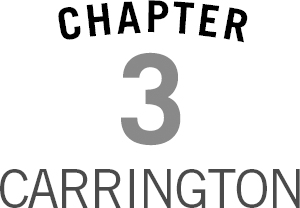
The Manager’s office is right in the thick of things at Carrington, United’s training ground, upstairs from the changing rooms, next to the canteen. If someone was to wander into the club at lunch on a Monday without checking the footy results first, they’d know exactly how United have got on just by taking a look at The Manager’s body language. As he buzzes around the dining tables at lunch, having a crack with people, chatting, joking (or not chatting, not joking), it’s written all over his face.
If we’ve won, like against Fenerbahçe, he laughs with everyone; he talks about the last game and gets excited about the next. If we’ve been playing really well, he tells unfunny jokes and shouts out silly trivia questions while we eat our lunch or get changed.
‘Lads, name the current players from the Premier League with a World Cup winners’ medal?’ he says.
He keeps us guessing for ages. I don’t think he actually knows the answers half the time. If he does, he never gives them to us when we pester him afterwards.
When he’s in a really good mood, the stories start. He goes on about his playing career and the goals he scored as a striker for Dunfermline and Rangers. He tells the tale about the time he once played with a broken back. Apparently everyone in the squad’s heard it – how bad the pain was, how he got the injury. The Manager tells the ‘Broke Back’ tale so many times that it’s not long before I know it from beginning to end. But it doesn’t stop him from telling it again, especially when he feels there’s a point to be made about injuries. The funny thing is, even though he talks about his playing days a lot, I’ve never seen any video evidence of his goals, so I don’t know how good or not good he was. I doubt he was as great as he makes out.
In my first few months at the club, I realise that when the atmosphere around Carrington is good – when we’re winning – I can go into The Manager’s office whenever I want, just for a chat. To be honest, I like going in there. It’s a big room, bigger than some dressing rooms I’ve been in. A huge window overlooks the training pitches so he can see just about everything that’s going on.
‘Wayne, the door is always open if you need to speak to me,’ he says.
When I go in there for the first time, shortly after my debut, we talk about the game, our upcoming opponents, how I should play to exploit their weaknesses. We talk about the title race and the league’s best players: Chelsea are strong he reckons, Arsenal and Liverpool, too. He tells me how he sees our team shaping up, how me and Ronaldo are going to do. We talk about horses, he tells me about his wine collection – apparently he has a big cellar at home. He doesn’t mention retirement, even though he’s at an age when most people would be happy to put their feet up, but that’s the measure of the man, I suppose.
I feel I can have a laugh with him as we’re playing well. I even make out that I already know the team for our next match, days before he’s announced it.
‘Who’s playing up front with me, boss? Am I playing up top on my own?’
He laughs. ‘Oh, so you think you’re playing, do you? Who else is in the team then?’
I rattle off a few names.
‘Yeah, well, you’re not too far off.’
As the season progresses, I discover that the only time I don’t like going in there is when I’ve been called up to see him. That usually means he’s unhappy with something I’m doing, or not doing, and it always happens when training has finished for the day. There’s a telephone in the players’ changing room. When it starts to ring, the lads know what’s coming next: a summons from The Manager. Someone’s going to get it.
‘Can you send Wayne to my office, please?’
When it’s me, the lads make funny noises, like I’m going to be in loads of trouble. Some of them make a sharp intake of breath, or whistle, just to wind me up.
Like the time in January 2005 when we’re preparing to play Liverpool. He makes the phone call. When I go into his office and sit on the big settee, he tells me I’m not playing well enough. He tells me I haven’t been thinking properly on the pitch.
‘You’ve got to start concentrating more, Wayne,’ he says. ‘I want you to keep things simple. You’re going out wide too much and I want you to stay up in the penalty area.’
I argue. I think it’s an unfair assumption of my game, but I accept his advice and get on with it. At Anfield I stay in the box as much as I can, I don’t drift wide. Then I answer him in the best way possible: I score the winning goal. Maybe that was his plan all along. Maybe he wanted to wind me up.
After a defeat, The Manager’s mood can be quite dark; he doesn’t talk to the players or joke around for a couple of weeks. He speaks to us as a group in team talks, but that’s as far as it goes. If anyone passes him at the training ground, he doesn’t say a word to them. I learn pretty quickly that it’s best to stay out of his way after a bad result. In my first few months at the club, when I see him eating in the canteen after a defeat, I steer clear. I get my food, keep my head down and walk to my table as quickly as I can.
*****
There’s one thought I can’t shake: the first time I was introduced to The Manager properly was when I signed for United at Old Trafford in the summer of 2004. I’d spoken to him once or twice when Everton played United – a quick hello in the tunnel, but that was it. The day I joined the club, I met him at Carrington and I was dead excited.
He drove me to Old Trafford and told me how I was going to fit into the team and how he wanted me to play. He told me about my new teammates: winger Ryan Giggs, England internationals Rio Ferdinand, Paul Scholes and Gary Neville; my new strike partner, Ruud van Nistelrooy – a goal machine.
I talked about the times I’d played at Old Trafford for Everton, how I’d been blown away by the atmosphere there. I’d even said to my dad afterwards, ‘I want to play for them one day.’
It was surreal. I’d been watching him on the telly for years with players like Eric Cantona and David Beckham, but I never imagined that it would happen to me. Later, when word got around back home about my day, a mate sent a text over.
‘BLOODY HELL!!!’ he said. ‘CAN’T BELIEVE U’VE GOT FERGIE CHAUFFEURING U AROUND.’
The Manager seemed like a really good bloke, but the next day I experienced his legendary influence first hand. It was a nice afternoon, so I drove over to Crocky to see the family. On the way, I spotted Mum and Dad in the car park of the local pub and I pulled over to say hello. We decided to go in for a drink, a diet pop for me. I was only there for 10 or 15 minutes before I went home, but a day later, The Manager called me into his office. My first summons.
‘Wayne, what were you doing in that pub in Croxteth yesterday?’ he said.
I couldn’t believe it. I’d not been in there long, but long enough for someone to make a phone call and grass me up. To this day I still don’t know who did it. I left the meeting knowing one thing, though: The Manager has eyes and ears everywhere.
Within weeks I know plenty more stuff. He has an amazing knowledge of the game. When we play teams, he knows everything about the opposition, and I mean everything. If a player has a weakness on his right foot, he knows about it. If one full-back is soft in the air, he’ll have identified him as a potential area of attack. He also knows the strengths of every single player in the other team’s squad. Before games we’re briefed on who does what and where. He also warns us of the players we should be extra wary of.
His eye for detail is greater than anyone else’s I’ve ever worked with, but that’s one of the reasons why I signed for him. That and the fact that he’s won everything in the game:
The Premier League.
The FA Cup.
The League Cup.
The Community Shield.
The Champions League.
The UEFA Cup Winners’ Cup.
The UEFA Super Cup.
The World Club Championship.
The Intercontinental Cup.
You can’t argue with a trophy cabinet like that.
*****
I start my first league game for United against Boro’ in October and we begin the game badly. By now I’ve learned that The Manager expects one thing from us when we play: to win.
After half an hour, we’re a goal down and unable to get a foothold in the game. I’m not playing well and he’s shouting at me from the dugout. I pretend not to hear him. I don’t turn around, I don’t want to make eye contact. I know he’s shouting, but I can’t really make out what he’s saying because the crowd’s so loud. I definitely don’t want to get up close enough to hear him because I know it’ll be scary.
He looks terrifying on the touchline.
We eventually draw 1–1 against Boro’ but The Manager isn’t happy. It’s a game we should have won and in my first few months at United I learn quickly that we have to attack until the end of a game, no matter what the score is. That’s The Manager’s football philosophy. He tells us that he wants the players to get behind the ball when we’re defending and move with speed when we’re attacking. He wants us to draw the opposition in, to lull them into a false sense of security. ‘That’s when they’ll start stringing passes together, growing in confidence,’ he tells us. ‘But it’s a trap.’
That’s when we’re supposed to win the ball back and punish the other lot with some quick passes through midfield. ‘The opposition won’t stand a chance,’ he says.
The ball needs to be fired out wide and hit into the box to me and Ruud. My role in all of this is to make good runs in behind the defence. When the ball comes to me in deeper areas I’m supposed to hold it up and bring other players into the game, like Ronaldo. When the ball gets played out wide I have to head for the box and get on the end of crosses.
If we play well, Carrington is a happy place. After Fenerbahçe, The Manager allows us to enjoy our training. We watch videos of all the things we’ve done well in a game and he tells us to continue playing the way we are. He wants us to keep up our winning momentum. If we can do that, the canteen is a happier spot for everyone.
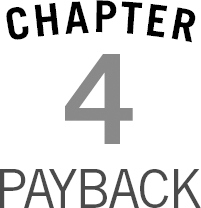
Arsenal, 24 October 2004.
Needle match.
It’s a needle match because Arsenal have been title rivals with United for over a decade. The two teams have had some pretty tasty games with one another in the past and there have been rucks, 20-man scraps and red cards.
The worst game took place the previous season when it kicked off between both sets of players. As I watched the game on the telly after playing for Everton, a row started between Ruud and some of the Arsenal lads – the type of fight fans always love watching. It began when striker Diego Forlan won a penalty; the Arsenal lot began complaining that he’d dived for it and when Ruud then spooned his spot-kick, a mob of their players crowded around him and got in his face, winding him up. They were angry because they thought he had got their skipper, Patrick Viera, sent off earlier in the game, but the reaction was horrible. Martin Keown was the worst; he screamed at Ruud and jumped up and down like a right head case. His eyes nearly popped out. He looked like a zombie from a horror film.


